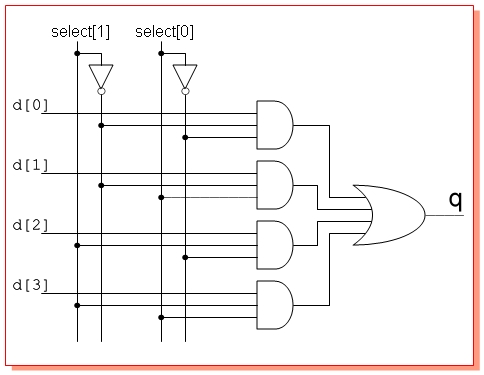Different ways to code Verilog: A Multiplexer example
源自於
http://electrosofts.com/verilog/mux.html
Let us start with a block diagram of multiplexer.
|
Example I
If select is 0, output q will be d[0]; if select is 1, q will be d[1]; if select is 2, q will be d[2] and if select is 3, q will be d[3]. This logic can be implemented using Verilog code as follows:
module mux1( select, d, q );
input[1:0] select;
input[3:0] d;
output q;
wire q;
wire[1:0] select;
wire[3:0] d;
assign q = d[select];
endmodule |
When select is 00, q will be assigned d[0], when select is 01, q will be assigned d[1] and so on.
Test_bench
module mux_tb;
reg[3:0] d;
reg[1:0] select;
wire q;
integer i;
mux1 my_mux( select, d, q );
initial
begin
#1 $monitor("d = %b", d, " | select = ", select, " | q = ", q );
for( i = 0; i <= 15; i = i + 1)
begin
d = i;
select = 0; #1;
select = 1; #1;
select = 2; #1;
select = 3; #1;
$display("-----------------------------------------");
end
end
endmodule
|

always statement
module mux2( select, d, q );
input[1:0] select;
input[3:0] d;
output q;
reg q;
wire[1:0] select;
wire[3:0] d;
always @(d or select)
q = d[select];
endmodule
|
if statement
module mux3( select, d, q );
input[1:0] select;
input[3:0] d;
output q;
reg q;
wire[1:0] select;
wire[3:0] d;
always @( select or d )
begin
if( select == 0)
q = d[0];
if( select == 1)
q = d[1];
if( select == 2)
q = d[2];
if( select == 3)
q = d[3];
end
endmodule
|
case statement
module mux4( select, d, q );
input[1:0] select;
input[3:0] d;
output q;
reg q;
wire[1:0] select;
wire[3:0] d;
always @( select or d )
begin
case( select )
0 : q = d[0];
1 : q = d[1];
2 : q = d[2];
3 : q = d[3];
endcase
end
endmodule
|
nested conditional statement
module mux5( select, d, q );
input[1:0] select;
input[3:0] d;
output q;
wire q;
wire[1:0] select;
wire[3:0] d;
assign q = ( select == 0 )? d[0] : ( select == 1 )? d[1] : ( select == 2 )? d[2] : d[3];
endmodule
|
|
Consider the expression bellow:
q = ( select[0].select[1].d[0] ) + ( select[0].select[1].d[1] ) + ( select[0].select[1].d[2] ) + ( select[0].select[1].d[3] )
module mux6( select, d, q );
input[1:0] select;
input[3:0] d;
output q;
reg q;
wire[1:0] select;
wire[3:0] d;
always @( select or d)
begin
q = ( ~select[0] & ~select[1] & d[0] )
| ( select[0] & ~select[1] & d[1] )
| ( ~select[0] & select[1] & d[2] )
| ( select[0] & select[1] & d[3] );
end
endmodule
gate level implementation
module mux7( select, d, q );
input[1:0] select;
input[3:0] d;
output q;
wire q, q1, q2, q3, q4, NOTselect0, NOTselect1;
wire[1:0] select;
wire[3:0] d;
not n1( NOTselect0, select[0] );
not n2( NOTselect1, select[1] );
and a1( q1, NOTselect0, NOTselect1, d[0] );
and a2( q2, select[0], NOTselect1, d[1] );
and a3( q3, NOTselect0, select[1], d[2] );
and a4( q4, select[0], select[1], d[3] );
or o1( q, q1, q2, q3, q4 );
endmodule
|




沒有留言:
張貼留言